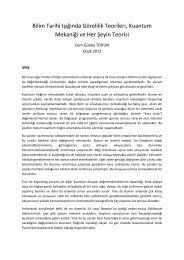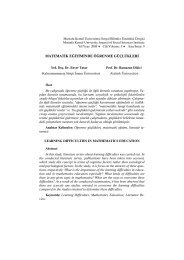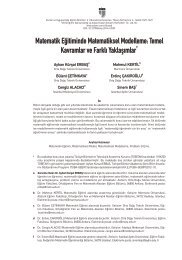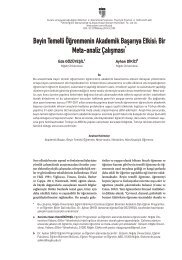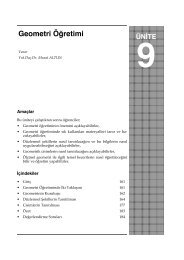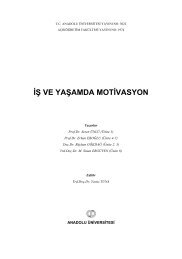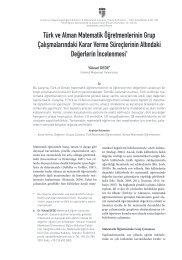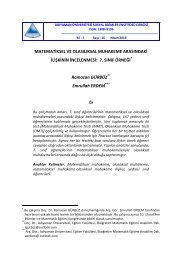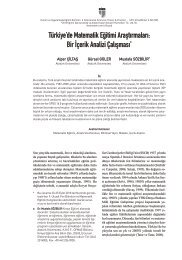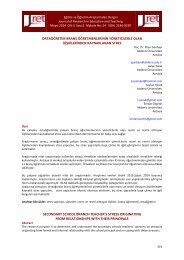Ufuk-U_niversitesi-SBE-Dergisi-S-ayı-5-kopya
Ufuk-U_niversitesi-SBE-Dergisi-S-ayı-5-kopya
Ufuk-U_niversitesi-SBE-Dergisi-S-ayı-5-kopya
You also want an ePaper? Increase the reach of your titles
YUMPU automatically turns print PDFs into web optimized ePapers that Google loves.
4. DISCUSSION AND RECOMMENDATION4.1 DiscussionIt was hypothesized in the present study that there would be a gender difference inhelp seeking attitudes of males and females. Significant differences were found between maleand female subjects. This finding is in line with previous studies which found that genderitself is a significant predictor of attitudes toward seeking professional psychological help(Nam et al., 2010; Sheffield et al., 2004). Many studies in the literature affirmed that femaleshave more positive attitudes towards psychological help seeking compared to males (Ang etal., 2004; Barwick et al., 2009; Gekoski & Knox, 2006; Kartalova-O’Doherty & Doherty,2010; Leong & Zachar, 1999; Mackenzie, Türküm, 2005; Nam et al., 2010; Özden, 2010;Svensson et al., 2009). The findings of the current study also supported previous research onthe effect of gender difference in attitudes toward psychological help-seeking and the resultsof the present study suggested that the attitudes to seeking psychological help in students wereremarkably more positive for female students.The reasons behind the difference between males and females in terms of theirattitudes towards seeking psychological help were investigated in several other studies. Thecontrast in this respect is mostly attributed to the reflection of gender role differences (Amit etal., 2009; Chan & Hayashi, 2010; Judd et al., 2008). Researchers affirmed that men’s socialstatus (Judd et al., 2008), lack of motivation, stigma attached to expressing feelings, the fearof intimacy (Silverberg, 1986), and the lack of fit with the culture of masculinity (Addis &Mahalik, 2003; Rochlen & Hoyer, 2005) may influence seeking help. However, these findingsdiffered from those of Furnham and Andrew (1996) who studied with Asians and a CaucasianBritish sample; Atkinson and Gim (1989) whose participants were Asian-American; and Bee-Gates, Howard-Pitney, LaFromboise, and Rowe (1996) who worked with Native American-Indian high school students had all found that there were no significant differences betweenmales and females with regards to the levels of attitudes towards help-seeking.In the literature, there are many contradictory findings about age variability and itseffect on attitude toward psychological help seeking. While some studies have found thatolder people have less favorable attitudes toward seeking psychological help than youngpeople (Lebowitz &Niederehe, 1992; Vessey & Howard, 1993), other studies have concludedthat older individuals associated with more positive attitude to help seeking than youngerindividuals (Al-Krenawi, Graham, Dean, & Eltaiba, 2004; Mackenzie, Gekoski & Knox,2006; Svensson, Nygard, Sorensen & Sandanger, 2009). In the current study, the results of thecorrelation analysis indicated that attitude toward psychological help seeking is negativelyassociated with age. In the present study, findings revealed that younger students indicated amore positive attitude than older students.In the present study the question of whether the faculty of students affects thestudents’ attitude toward psychological help seeking was also analyzed. The results of thestudy supported the previous research on the effect of faculty on attitudes towardpsychological help-seeking. Faculty of Engineering was found to have less positive attitudestoward help-seeking than Faculty of Education, Faculty of Arts and Sciences, Faculty of36





